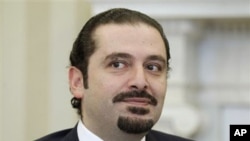Lebanese leaders say talks on forming a new government are expected to begin Monday after opposition Hezbollah ministers and their allies forced the collapse of Prime Minister Saad Hariri's unity government, plunging the country back into crisis.
President Michel Suleiman Thursday called on Mr. Hariri to remain in a caretaker role until a new Cabinet is formed.
On Wednesday, 11 opposition members of the 30-member Cabinet resigned over Mr. Hariri's refusal to denounce a United Nations-backed investigation into the 2005 assassination his father, the country's former prime minister, Rafiq Hariri.
Media reports say the U.N. indictments will likely target Hezbollah members. Hezbollah denies involvement in the killing.
Members of the Shi'ite militia said Thursday the candidacy of Mr. Hariri - Lebanon's Sunni leader - to head a new government is "unacceptable." By Lebanese law, the prime minister must be appointed from the Sunni Muslim sect, the president is a Christian and the speaker of the house a Shi'ite.
Mr. Hariri is set to hold talks with Turkish Prime Minister Recep Tayyip Erdogan Friday in Ankara after meetings with French President Nicolas Sarkozy late Thursday in Paris.
Also Thursday, two grenades were thrown at the headquarters of Lebanese Christian leader Michel Aoun's Free Patriotic Movement, a Hezbollah ally.
U.S. officials say they are monitoring the situation closely.
Wednesday's resignations took place as Mr. Hariri was meeting with U.S. President Barack Obama, who expressed his support for the prime minister.
A White House statement said Mr. Obama commended Mr. Hariri for his "steadfast leadership and efforts to reach peace, stability and consensus in Lebanon under difficult circumstances."
U.S. Secretary of State Hillary Clinton said Hezbollah's actions are a "transparent effort" to "subvert justice and undermine Lebanon's sovereignty and independence."
Meanwhile, Lebanese media reports say Hezbollah leader Hassan Nasrallah will address developments in a speech "soon."
Observers say the immediate trigger for Hezbollah's withdrawal was the failure of talks between Syria, which backs the Shi'ite militant group, and Saudi Arabia, a Hariri ally, to try to find a compromise over the U.N. tribunal.
Some information for this report was provided by AFP and Reuters.




